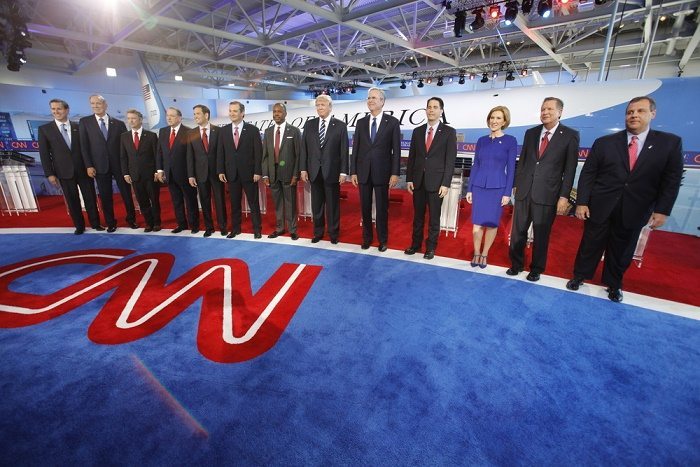Upcoming GOP Debate Could Touch on Radical ‘Personhood’ Laws
"With personhood repeatedly being brought up—and defeated by landslide margins—on the Colorado ballot, it would seem relevant to the upcoming Republican debate being held in Boulder next week,” said Karen Middleton, director of NARAL Pro-Choice Colorado.

In advance of next week’s Republican presidential debate in Colorado, birthplace of the “personhood” ballot initiative, the anti-choice Personhood Alliance has unveiled a web page claiming that two of the top six GOP candidates pledged to sponsor federal personhood legislation, but never did.
U.S. Sens. Ted Cruz of Texas and Marco Rubio of Florida in 2012 and in 2010, respectively, pledged to sign federal personhood legislation, called the Life at Conception Act, which would give zygotes (fertilized human eggs) legal rights as a person under the U.S. Constitution, according to documents cited by the Personhood Alliance.
The history of the personhood movement in Colorado, where voters have overwhelmingly defeated the measure on the statewide ballot three times, could propel abortion issues into Wednesday’s presidential debate—or the discussion leading to it—even though the debate will purportedly focus on traditional economic issues.
“The issue works for the largest group of people voting in the early Republican caucuses and primaries, particularly the caucuses,” said Robert Loevy, professor emeritus of political science at Colorado College. “So there will be a temptation during the debate to go to the abortion issue.”
“With personhood repeatedly being brought up—and defeated by landslide margins—on the Colorado ballot, it would seem relevant to the upcoming Republican debate being held in Boulder next week,” said Karen Middleton, director of NARAL Pro-Choice Colorado. “Personhood groups certainly seem to think it’s a litmus test for Republican primary voters.”
The Personhood Alliance is working with state groups across the country to educate candidates and their members on the radical personhood measure.
“In 2012, the personhood movement had a big impact in Iowa, South Carolina and Colorado, all states that did not support Mitt Romney, who was unquestionably the weakest candidate on abortion,” Gualberto Garcia Jones, national policy director of the Personhood Alliance, said in an email to Rewire. “We intend to educate our many supporters and make sure that they take the candidate’s record into consideration before voting for them in the primary.”
Jones thinks that, between Cruz and Rubio, personhood supporters have a better chance of convincing Cruz to embrace personhood fully.
“The Cruz campaign has been at the forefront of the defunding Planned Parenthood battle, while Senator Rubio did not even go back to D.C. to cast a vote on the attempt to defund Planned Parenthood,” wrote Jones. “On the whole, I think that due to the entrenched institutional aspects of the battle against abortion, I think that Senator Cruz’s approach of being willing to fight the ‘Washington cartel’ as he calls it is the best suited to fight the abortion cartel.”
Loevy said candidates like Rubio may have their eye on the general election.
“The personhood amendments are complex and were defeated, so candidates who bring that up are running the risk that it could be a problem in the general election,” Loevy said.
Colorado Republicans introduced personhood legislation just two months after voters decidedly struck down the state’s personhood ballot measure. Cathy Alderman, spokesperson for Planned Parenthood Votes Colorado, said the state’s GOP legislators “[ignored] the values of Colorado voters” by pushing the anti-choice law that would subject doctors to a class 3 felony for performing an abortion and threaten jail time for women who receive abortion care.
Jones said former Florida Gov. Jeb Bush must be considered a “weaker pro-life candidate,” while candidates Donald Trump and Carly Fiorina “feel they have to be pro-life to participate in the GOP primary, but neither has the record to inspire any kind of confidence.”
Jones, who disagrees with scientific consensus surrounding abortion care, wrote that candidate Dr. Ben Carson is an “interesting person” with “regards to personhood.”
“As a doctor, a pediatrician no less, he also has to be aware of the scientific fraud upon which the abortion movement is founded, namely that we ‘can’t determine when life begins,'” Jones wrote. “And yet he has had problems answering that very basic scientific question, and he has also admitted to experimenting on cells from aborted babies, and even referred women to abortions.”
NARAL’s Middleton said GOP presidential candidates, if and when so-called personhood measures are discussed in the upcoming debate, will have an important political choice to make.
“Republican candidates need to make up their minds and declare whose side they’re on: the anti-choice, anti-woman, anti-reproductive health extremists in their base, or the mainstream, pro-choice values of most Coloradans and most Americans,” Middleton said.
Fading Republican presidential candidates, such as Sen. Rand Paul of Kentucky and former Arkansas Gov. Mike Huckabee, are on record supporting personhood.
“Unfortunately, Huckabee is not getting the traction that he did in 2008, but he is still a great advocate of Personhood,” Jones said.
